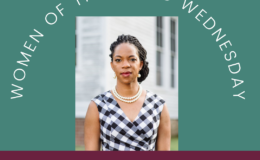 Amanda Berry Smith is this month’s featured Woman of the Word. She was an Army Wife, Preacher, and International Missionary.
Amanda Berry Smith is this month’s featured Woman of the Word. She was an Army Wife, Preacher, and International Missionary.
Amanda Berry Smith: Army Wife, Preacher, and International Missionary
by Morgan D. Farr
“To stay here and disobey God – I can’t afford to take the consequence. I would rather go and obey God than to stay here and know that I disobeyed.”
A missionary spoke this quote in the Great Century (1800s). If I asked you who said it, you might guess the likes of William Carey, David Livingstone, or Henry Townsend. But it wasn’t one of the well known nineteenth century missionaries. Instead, this quote is from a former enslaved woman who traveled the globe sharing the gospel.
Amanda Berry Smith’s story is a testament to God’s faithfulness in the life of a woman obedient to his calling.
Prior to Military Life
Amanda Berry Smith was born into slavery in 1837 on a farm in Maryland. She was one of thirteen children born to her parents who were also enslaved on separate plantations. Her father Mr. Samuel Barry worked extra shifts at night to be able to free himself, Amanda’s mother Mariam, and five of their children, in cluding Amanda. The other eight children died prior to their liberation. The family credited the prayers of Amanda’s maternal grandmother for their freedom.
cluding Amanda. The other eight children died prior to their liberation. The family credited the prayers of Amanda’s maternal grandmother for their freedom.
Despite their eventual liberty, life was not easy in the United States for a black family in the 1850s, even in Pennsylvania where they settled. Mr. Barry was unable to earn enough to provide for the family. Amanda started work in domestic service at the age of thirteen. She began attending a Methodist Episcopal church which had integrated services and Sunday schools classes and her faith flourished.
Military Wife
Amanda married her first husband Calvin Devine in 1854, when she was just seventeen years old. During the Civil War, Calvin was a Soldier for the Union. He was killed in action, leaving Amanda to raise their one daughter. In 1865, Amanda married James Smith who was a deacon in the Philadelphia African Methodist Episcopal Church. The marriage was tumultuous and Mr. Smith died just three years later, once again making Amanda a widow.
Stateside Ministry
At a time when racial discrimination was common, Amanda had difficulties in the few mixed congregations she was able to attend. In her autobiography Amanda talks about the constant slights–being allowed to only take communion after all the white people had been served first and being treated with a perfunctory and discourteous manner. Despite the mistreatment, Amanda continued in her faith.
In 1868, Amanda felt her calling from God to preach, but she was not allowed because she was a woman. Again, difficulty did not stop her. Amanda was able to procure a letter of recommendation from Reverend Nelson Turpin to begin to teach and preach. Amanda traveled throughout New England and the middle states, becoming well known for her teachings. At this point in history, the United States was still a very young country and was not yet complete to the west. This makes Amanda’s speaking engagements as far west as Cincinnati, Ohio incredible!
International Missionary
In 1879, with only a week to prepare, Amanda set off to England to share the gospel. During her trip across the ocean Amanda preached in the saloon on board the Ohio, since there was no minister to conduct services on Sunday morning. Amanda preached in England for a year and eight months when she then went to both Ireland and Scotland to continue her ministry.
Miss Lu Drake of Niagara Falls was a missionary in India and had met Amanda in America. While on a holiday in England the women reunited. Both women felt God calling Amanda to India. The two women prayed for the funds to travel by land to India, and God provided! Together they traveled from London to Bombay where Amanda preached for eighteen months before returning to London to attend the Ecumenical Conference of 1881. Sixty days later Amanda was on a ship headed to preach the gospel in Liberia. Once there, Amanda preached and established temperance societies. Despite illness and disease Amanda preached in Liberia for eight years.
In 1899, Amanda returned to the United States and founded the Amanda Smith Orphanage and Industrial Home for Abandoned and Destitute Colored Children. This was the first orphanage for African American children in Illinois. The state of Illinois continued to run the school after her death in 1915.
So What?
Amanda Smith was born into a time when society granted African American women few opportunities. Despite this, Amanda trusted God’s provision for her life and traveled the world sharing the gospel and encouraging temperance. Even after serious illness during her time in Africa, Amanda continued to serve the Lord in her care for orphans. The study of Amanda’s life shows the fruits of the spirit played out.
 From Amanda Smith we can learn about true trust in God to provide for our needs, even amidst obstacles.
From Amanda Smith we can learn about true trust in God to provide for our needs, even amidst obstacles.
Closing Prayer
Father, thank you for Amanda Berry Smith. Thank you for her Bible-believing Grandmother, who prayed for her freedom and for her father, who worked for it. We thank you for sustaining her after the loss of both her husbands. Thank you for providing a way for her ministry and for allowing her story to be told. Help us to step out in faith as Amanda did and serve the least of these. Amen.
Notes and Resources
- If you want to hear more about Amanda, check out our podcast Deeply Rooted, where Dr. Denise Jolly and Morgan Farr discuss Amanda’s life and the impact of her work.
- Gary B. McGee, “Smith, Amanda (Berry),” in Biographical Dictionary of Christian Missions, ed. Gerald H. Anderson (New York: Macmillan Reference USA, 1998), 625.
- Amanda Smith: The Life and Mission of a Slave Girl
- https://www.bu.edu/missiology/missionary-biography/r-s/smith-amanda-berry-1837-1915/
- https://www.blackpast.org/african-american-history/amanda-berry-smith-1837-1915/
- https://www.womenhistoryblog.com/2006/10/amanda-smith.html
- https://blackthen.com/amanda-berry-smith-opened-first-orphanage-for-black-children-in-illinois/
If you missed the introduction to our Women of the Word Series, take a look at it here.





